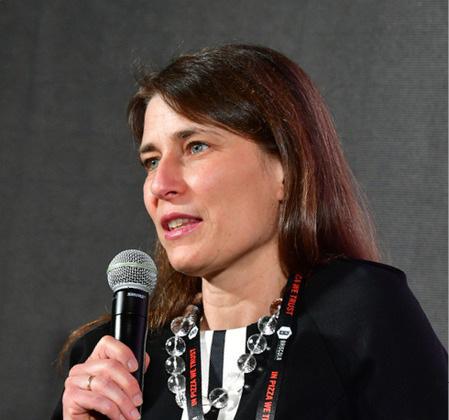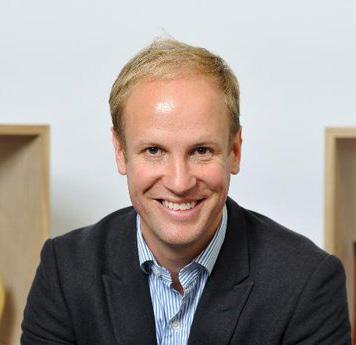
6 minute read
Embracing innovation in a competitive environment
Nard Clabbers is Senior Business Developer Personalized Nutrition and Health at TNO, where he,
together with Wageningen University, has set up a large international research consortium that
investigates technical and social innovations to enable personalised nutrition through consumer empowerment. This pre-competitive public-private consortium is unique in combining different scientific expertise and using real-world field labs.
Manuela Borella is Vice President of Danone’s Innovation Incubator. Her passion for harvesting diverse talent to unlock team potential, in addition to a rich corporate network, enabled her to lead one of the first successful multinational incubators. She has a deep wealth of operational experience in corporate strategy, brand building, P&L management and marketing.
Julian Mellentin is the Founder of New Nutrition Business, expert consultancy services to ingredient and branded product companies on all aspects related to nutrition and health since 1995. The company has offices in London, Scotland, Portugal, USA, and affiliates in Korea and Japan. Their customers range from global players to startups, and NNB is best-known for its annual 10 Key Trends in the Business of Food & Health.

Jeremy Basset is CEO of Co:Cubed where he works with some of the world’s largest businesses to re-think their organisational approach to innovation, and help them build and execute their collaborative innovation capabilities. Prior to launching CO:CUBED, Jeremy spent 13 years at Unilever where he was responsible for launching and then leading the Unilever Foundry, Unilever’s platform to engage with startups and innovative companies who can help Unilever pioneer the future. Through the Foundry, over 1500 of Unilever marketers have worked with over 200 startups, brining innovative technology and an entrepreneurial culture to Unilever.

Maarten Ooms is Managing Director in Rabobank’s Financial Advisory and Solutions group, where he oversees their Food and Agri Innovation initiatives in the European region. As part of his responsibilities, he assists young growth companies raise capital in private placement rounds.
While size gives larger food companies a strategic advantage in terms of marketing heft and brand recognition, they can be slower to react to market shifts and new consumer demands. This creates opportunities for more agile startups to prosper. What should businesses – large and small – be doing to embrace innovation and keep ahead of the competition?

These were some of the issues debated at a Future of Nutrition Summit 2019 panel discussion, entitled ‘Innovating the food system: how are companies embracing the faster pace of change in the food system?’, moderated by Nard Clabbers from TNO. The panellists included Julian Mellentin from New Nutrition Business, Manuela Borella from Danone, Maarten Ooms from Rabobank and Jeremy Basset from CO:CUBED.
The struggles of open innovation As always, time is of the essence. Investing in innovation is critical as consumer expectations have increased. They have far more data and information at their disposal, noted Nard Clabbers. A key challenge here, however, is managing the different speeds that startups and corporate entities tend to move at, in order to ensure a shared common objective.
According to Maarten Ooms what is important is to carefully manage the innovation process, and to clearly set out objectives and milestones. He said, that there needs to be expectation management. Manuela Borella agreed with this point and noted that, often, the necessary administrative tasks such as legal agreements and NDAs, can be time consuming and complicate the relationship between a startup and multinational unnecessarily. She further advises that these tasks can be outsourced to a back office to allow attention to be focused on those aspects that really brings the most value.
Julian Mellentin advised that startups should avoid working with publicly quoted companies during the investment phase, because they are more likely to cut off early during the development process if objectives are not being met. He suggested that private companies tend to be more flexible in this respect.
Organic growth still relevant The panel debated whether the focus of F&B businesses has shifted from organic growth to disruptive innovation. According to Mellentin, organic growth still drives innovation within those companies who remain in tune with consumer trends and motivations;
“Branded food companies are getting lots of organic growth, and the ones who are, are the ones who stand closest to consumer trends and understand best what the drivers are for people to purchase products. A good example of this is a company that saw how low-sugar ice cream was taking off in the U.S. and introduced a similar product to Europe, with massive success. As far as consumers are concerned, they see something new on the shelf and, in their eyes, that is an innovation.”
Mellentin concluded:
Manuela Borella highlighted the importance of data to determine whether innovation in a specific sector is needed.
Sustainability driving innovation The panellists were all in agreement that the biggest driver of innovation at present is sustainability. Maarten Ooms noted that in the concept of a healthy planet, healthy people are a key trend and businesses that cannot provide proof of sustainability, run a big risk.
Danone, for example, has fully embraced the concept under the vision of ‘One Planet, One Health’. As Borella said;
Tips for success As summary of the discussion, Clabbers asked the panellists:
Maarten Ooms underlined the importance of businesses embracing innovation from the top-down. This is key to success, he said, noting that one difference between the U.S. and Europe is that Europeans are far more afraid of failure. “Innovation needs to come from the CEO-level, or it doesn’t come.”
Jeremy Bassett agreed with this point; however, added how critical it is to also ensure that the full support from the entire board is gained. Without it, even a potentially great idea backed by an enthusiastic CEO can often become very costly to an organisation if the board is ambivalent from the start. Millions of euros are regularly wasted on the endeavours of a newly appointed chief innovation officer in convincing an unwavering board on how the innovation could be profitable.
Borella also highlighted the importance of differentiating between theory and strategy, as Danone experienced first-hand with one of their projects.
“[You cannot expect that] just because the top management in an office in Amsterdam wanted something that in the UK, the business unit will execute it,” she said.
Basset added:
“Think about innovation in the same way as you would think of diversity, it is everyone’s responsibility to be involved in innovation across an organisation, but some get it more than others. We see this again and again. The lesson here is that innovation teams need to engage the whole business and be able to enable and inspire a whole organisation.”
Visit Fi Global insights to watch the video recording of the panel discussion: bit.ly/Innovating-Food-System-Panel-Discussion








